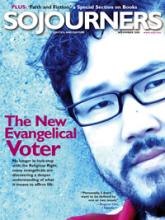The upcoming presidential election wraps up months of campaigning, in which each political party has tried to outdo the other in its public storytelling. The narratives follow familiar terrain: “We are the party of change,” says one. “We will keep America strong,” says another. Each party has spent millions to present its candidate as the true “outsider” to Washington politics, the honest crusader who can fix what’s broken in America. These storylines are carefully crafted to appeal to our ideals and our frustrations—in short, they tell us what we want to hear.
Leaders the world over use their power to shape narratives—to good and bad effect. Under repressive governments, such as in China or under South Africa’s apartheid regime, storytellers of a different kind—writers—are among those who suffer when their work doesn’t conform to prevailing social, political, religious, or cultural narratives. Their work is banned, they are silenced, put in prison, exiled—or worse. Unlike politicians, writers often tell their governments, and us, what we don’t want to hear.
The death of Aleksandr Solzhenitsyn earlier this year reminds us of the powerful impact of his One Day in the Life of Ivan Denisovich. This slim volume penetrated the silence of the Stalin-era Soviet Union by telling the story of Ivan Denisovich Shukov, a peasant imprisoned in a Siberian concentration camp. Solzhenitsyn—who spent eight years in similar camps himself—describes Ivan’s day, from morning reveille to evening bedtime, as he follows the petty, arcane rules of staying alive. This tiny revolution of words allowed the world to see what happened to those on the wrong side of Soviet power. For his efforts Solzhenitsyn was exiled, but not stopped; his three-volume indictment of the Gulag system, The Gulag Archipelago, was published about 10 years later.
Read the Full Article
